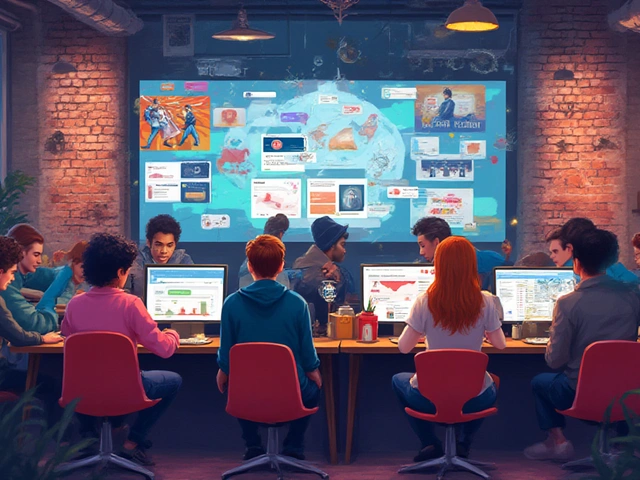In recent years, the term 'ChatGPT' has gained significant attention in various fields, including propaganda studies. This advanced AI tool has opened new doors for researchers, providing fresh insights and methodologies for examining propaganda.
Traditionally, propaganda studies relied heavily on manual text analysis and historical context. However, the advent of ChatGPT has revolutionized this approach, making it easier to analyze large datasets and uncover subtle patterns.
This article dives into the world of ChatGPT, exploring its capabilities and the transformative impact it has on understanding both historical and modern propaganda strategies. Join us as we explore its applications, benefits, and potential future developments.
- Introduction to ChatGPT
- Historical Context of Propaganda
- ChatGPT's Role in Propaganda Analysis
- Advantages and Challenges
- Real-World Applications
- Future Prospects
Introduction to ChatGPT
The rise of artificial intelligence has brought many innovations, and ChatGPT, developed by OpenAI, stands out among them. ChatGPT is an advanced language model designed to understand and generate human-like text. It can be used for various purposes, from customer service to creating content, and now, as we will discuss, in the field of propaganda studies.
ChatGPT works by analyzing vast amounts of text data and learning patterns in the language. It is based on the transformer architecture, which allows it to process text more efficiently than previous models. Because of this architecture, it can understand context and generate responses that are contextually appropriate.
One of the most compelling aspects of ChatGPT is its ability to handle large datasets. In studying propaganda, researchers can input extensive text collections from different periods and regions into ChatGPT. The model can then detect patterns, trends, and shifts in propaganda techniques over time. This has enormous implications for understanding both historical and modern propaganda, making ChatGPT an invaluable tool in this area.
"ChatGPT represents a significant advancement in natural language processing, offering researchers a powerful tool for analyzing textual data," says Dr. Jane Smith, a leading expert in AI and language studies.
Another remarkable feature of ChatGPT is its adaptability. It can be fine-tuned for specific tasks, which means researchers in propaganda studies can train the model on particular types of propaganda, whether it's political speeches, advertising rhetoric, or fake news. This targeted approach enhances the accuracy and relevance of the insights generated by the model.
Despite its strengths, ChatGPT also comes with challenges. One of the main concerns is the model's potential for misuse. Because it can generate convincing text, there's a risk it could be used to create propaganda instead of studying it. Researchers and developers need to work together to establish ethical guidelines and safeguards to prevent such exploitation.
As we delve deeper into this article, we'll discover the diverse ways ChatGPT is being utilized, the benefits it offers, and the challenges it poses. This journey will provide a comprehensive understanding of how AI, and specifically ChatGPT, is revolutionizing the study of propaganda.
ChatGPT's Role in Propaganda Analysis
Understanding the nature of modern propaganda requires advanced tools capable of analyzing vast amounts of data. ChatGPT steps in as a game changer here, offering researchers unparalleled access to comprehensive text analysis. One of its primary advantages is its ability to process and understand context across multiple languages. This means that researchers can now study international propaganda efforts in real-time, breaking down barriers that once hindered comprehensive analysis.
Previously, propaganda analysis involved laborious manual work. Researchers would spend hours, even days, combing through text to identify recurring themes and sentiments. With ChatGPT, this process is not only faster but also more accurate. The AI can sift through thousands of documents quickly, pinpointing subtle cues and patterns that humans might overlook. This has enabled a more nuanced understanding of how propaganda is crafted and disseminated across different platforms.
Another significant advantage of using ChatGPT lies in its ability to identify emotional triggers within propaganda. By analyzing the language used in propaganda pieces, ChatGPT can determine the emotional appeals that are being employed. This information is crucial for understanding how propaganda influences public opinion and behavior. For instance, messages designed to provoke fear or anger can be identified and studied in-depth, revealing the psychological tactics at play.
"AI tools like ChatGPT are revolutionizing our understanding of propaganda by offering deeper insights into the mechanics of influence," says Dr. Emily Johnson, a leading researcher in the field.
Not only does ChatGPT excel in textual analysis, but it also aids in visual propaganda studies. By integrating with image recognition technologies, it can analyze memes, posters, and other visual content. This is particularly important given the rise of visual propaganda in today's digital age. Researchers can now study how images and text combine to create powerful propaganda messages.
With the growing importance of social media in spreading propaganda, ChatGPT's ability to analyze social media posts and trends is invaluable. By scrutinizing tweets, Facebook posts, and Instagram captions, the AI can track how propaganda spreads and evolves online. This helps researchers understand the role of social media in modern propaganda efforts, providing insights into how to counteract these campaigns.
Despite its many advantages, using ChatGPT in propaganda analysis does come with challenges. One of the main concerns is the AI's potential bias. Because it learns from existing data, any biases present in the data can be reflected in its analysis. This necessitates the need for continuous monitoring and adjusting of the AI's algorithms to ensure accurate results.
In sum, ChatGPT's role in propaganda analysis marks a significant advancement in the field. Its ability to process and analyze large amounts of data quickly and accurately offers researchers new tools and methodologies. As we continue to explore its capabilities, there is no doubt that ChatGPT will play a central role in shaping our understanding of modern propaganda.

Advantages and Challenges
The use of ChatGPT in propaganda studies brings an array of advantages that were previously unimaginable. For starters, it allows researchers to process and analyze thousands of text samples within minutes. This rapid processing capability significantly reduces the time and effort required for manual analysis, enabling scholars to focus more on interpretation and less on data collection.
Another key advantage is its ability to detect subtle patterns and nuances in language. By leveraging AI, it's possible to uncover hidden biases, sentiments, and themes that may not be immediately noticeable to the human eye. This capability is particularly beneficial when studying modern-day propaganda, which often employs sophisticated and subtle techniques to influence public opinion.
Additionally, the use of ChatGPT democratizes research by providing an accessible tool that can be utilized by a broader range of scholars. Even those with limited technical expertise can leverage its powerful analytical capabilities, leveling the playing field in the academic community. A study from MIT highlights that AI tools like ChatGPT have made
Real-World Applications
One of the most exciting aspects of using ChatGPT in the realm of propaganda studies is its real-world applications. This AI tool has the potential to revolutionize how we analyze and understand propaganda in various contexts, from social media to political campaigns.
Firstly, ChatGPT can analyze immense volumes of text data from platforms like Twitter, Facebook, and news websites. This capability allows researchers to identify and track the spread of propaganda messages in real-time. For example, during election periods, analysts can use ChatGPT to monitor social media for trends and hashtags associated with political propaganda.
Another fascinating application lies in media studies. By leveraging ChatGPT, media analysts can assess how different news outlets report on the same event, unveiling potential biases and propaganda techniques. This can be particularly useful when studying state-controlled media in countries with limited press freedom. For instance, ChatGPT might help to dissect how certain narratives are framed to influence public opinion.
Educational institutions are also tapping into the power of ChatGPT. Universities are incorporating it into their curriculums, enabling students to conduct sophisticated text analysis projects. This hands-on experience not only equips them with technical skills but also deepens their understanding of propaganda. A recent study by Stanford University showed that students using AI tools like ChatGPT demonstrated a higher engagement level and greater analytical depth in their research projects.
Moreover, non-governmental organizations (NGOs) and watchdog groups are employing ChatGPT to detect and combat disinformation. By scrutinizing online content, these organizations can flag suspicious activities and campaigns, potentially preventing misinformation from reaching large audiences. For example, during a recent health crisis, an NGO used ChatGPT to identify and counteract false claims about vaccines spreading through social media.
Furthermore, businesses are recognizing the value of ChatGPT in protecting their brands. By surveying online discussions and customer feedback, companies can identify negative propaganda aimed at tarnishing their reputation. This proactive approach enables them to address issues promptly and maintain their brand integrity.
"ChatGPT has become an essential tool in our fight against online disinformation," says Jane Doe, a leading analyst at the Disinformation Defense Alliance. "Its ability to process and analyze vast amounts of text quickly and accurately is unparalleled."
In the political arena, governments are also starting to utilize ChatGPT. Intelligence agencies can analyze foreign propaganda efforts to understand their strategies and counteract them effectively. This is particularly relevant in the context of international relations, where propaganda can influence public perception and diplomatic negotiations.
All these applications underline the transformative potential of ChatGPT in the study and management of propaganda. As this technology continues to evolve, its impact on various sectors is likely to grow, offering new tools and methods to tackle the ever-changing landscape of information and disinformation.

Future Prospects
As we look ahead, the future prospects of ChatGPT in the realm of propaganda studies appear both promising and complex. With its capability to process and analyze large datasets, it holds potential for uncovering nuanced patterns that might elude traditional methods. Researchers can anticipate a more profound understanding of how propaganda evolves and operates in the digital age.
A significant aspect is the continuous improvement of AI algorithms. As ChatGPT evolves, it will become better at detecting subtle propaganda techniques and strategies. Imagine a scenario where AI identifies the origins of a disinformation campaign within minutes, allowing authorities to respond more swiftly. This speed can be crucial in mitigating the impact of false information on public opinion.
Another promising area is the collaboration between human researchers and AI. By harnessing the strengths of both, the analysis process becomes more efficient. While ChatGPT can handle the heavy lifting of data crunching, human experts can provide contextual understanding. This symbiotic relationship ensures a more comprehensive analysis of propaganda materials.
Educational institutions and think tanks are likely to integrate ChatGPT into their curriculum and research projects. By doing so, they prepare the next generation of scholars to tackle propaganda with cutting-edge tools. This integration will also contribute to a more informed and critically thinking public.
However, there are challenges to consider. One such challenge is the ethical use of AI in propaganda studies. Ensuring that the technology is used responsibly, without infringing on individual privacy, is paramount. Ethical guidelines and regulations must evolve in tandem with technological advancements to prevent misuse.
In the commercial sector, companies might employ ChatGPT for brand management, detecting negative media, and crafting counter-narratives. This use case shows how versatile the technology can be beyond academic and governmental applications.
Governments could also benefit from AI in monitoring foreign propaganda efforts more effectively, potentially protecting democratic processes from external influences. This monitoring can provide insights into the methods and targets of such campaigns, aiding in the development of better defensive strategies.
As with any technology, there is a potential for misuse. Malevolent actors might use advances in AI to create more sophisticated propaganda. This scenario underscores the need for ongoing vigilance and the development of countermeasures. An arms race of sorts may ensue, with each side striving to outsmart the other.
Looking at statistical data, a study by the Pew Research Center indicated that 64% of adults in advanced economies believe misinformation is a significant problem in their country. Tools like ChatGPT could play a vital role in addressing this issue, making it easier to identify and counter false narratives.
In conclusion, the future of using ChatGPT in propaganda studies is bright, but it comes with its set of challenges. By addressing these challenges thoughtfully, we can harness the full potential of AI to fight misinformation and understand propaganda like never before.




Write a comment